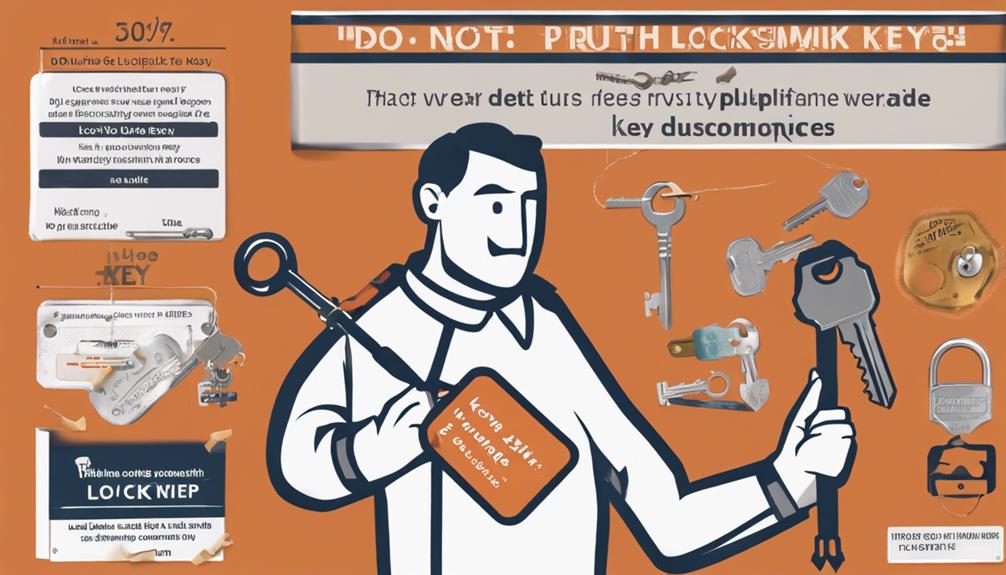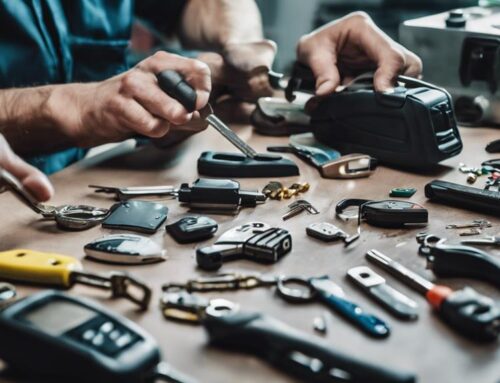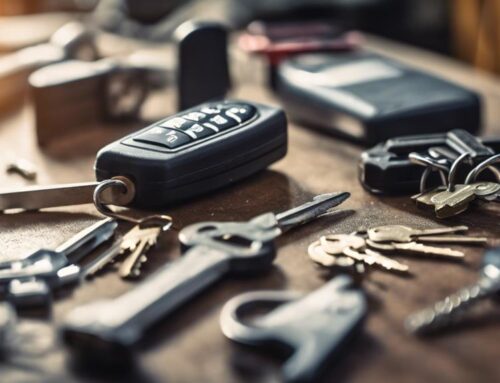Restricted keys are essential for heightened security, as they limit unauthorized duplication and access to specific individuals. Legal regulations mandate that only authorized personnel or locksmiths can duplicate restricted keys to maintain property protection. Ownership or proper authorization is required for lawful duplication, with patented keys strictly governed to prevent unauthorized reproduction. Be cautious of legal consequences arising from unauthorized duplication, which can compromise security. Understanding the nuances of restricted key systems is important for safeguarding your assets effectively. If you wish to explore further into the legalities and benefits of restricted keys, additional information is available in the research provided.
Key Takeaways
- Restricted keys have unique features to prevent unauthorized duplication.
- Legal duplication requires ownership or authorization.
- Only licensed locksmiths can legally duplicate restricted keys.
- Unauthorized duplication compromises security and may have legal consequences.
- Strict regulations govern key duplication to maintain security and prevent breaches.
Understanding Restricted Keys
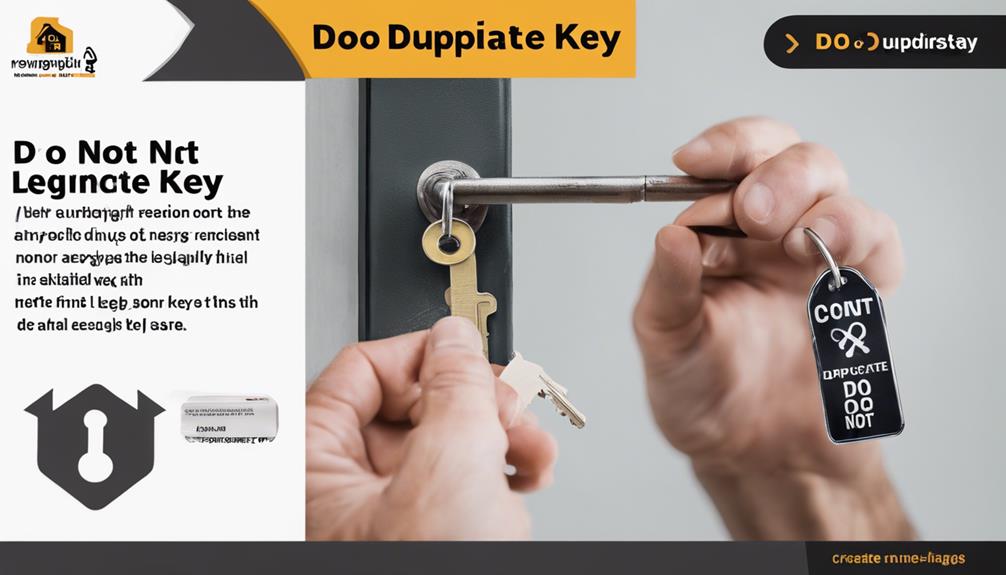
When it comes to understanding restricted keys, it is crucial to grasp the unique security features they offer. Restricted keys are a significant component of key security systems, providing an added layer of protection against unauthorized duplication. Unlike conventional keys, restricted keys are designed with specific key types that can only be duplicated by authorized individuals or locksmiths. This key security feature guarantees that your keys cannot be easily copied without your consent, enhancing the overall security of your property or business. By utilizing restricted key systems, you can have peace of mind knowing that your keys are not easily replicable, safeguarding your assets from potential threats. Additionally, high-security lock brands like ASSA-Abloy and Evva Locks often incorporate restricted key systems into their products for maximum security.
Purpose of Restricted Key Systems
Occasionally overlooked but essential in enhancing security measures, restricted key systems are designed to provide a higher level of key control and prevent unauthorized key duplication. These systems offer robust security enhancements by limiting access to specific individuals or authorized personnel only. By utilizing restricted keys, you can effectively control who has the ability to duplicate keys and access certain areas, thereby enhancing access control within your premises. This added layer of security guarantees that only those with permission can duplicate keys, minimizing the risk of unauthorized entry. Implementing a restricted key system is a proactive approach to safeguarding your property and assets, offering peace of mind knowing that your keys are not easily replicated without proper authorization. Furthermore, understanding the benefits of restricted key systems can markedly improve the overall security of your property enhancing security measures.
Legal Regulations on Key Duplication
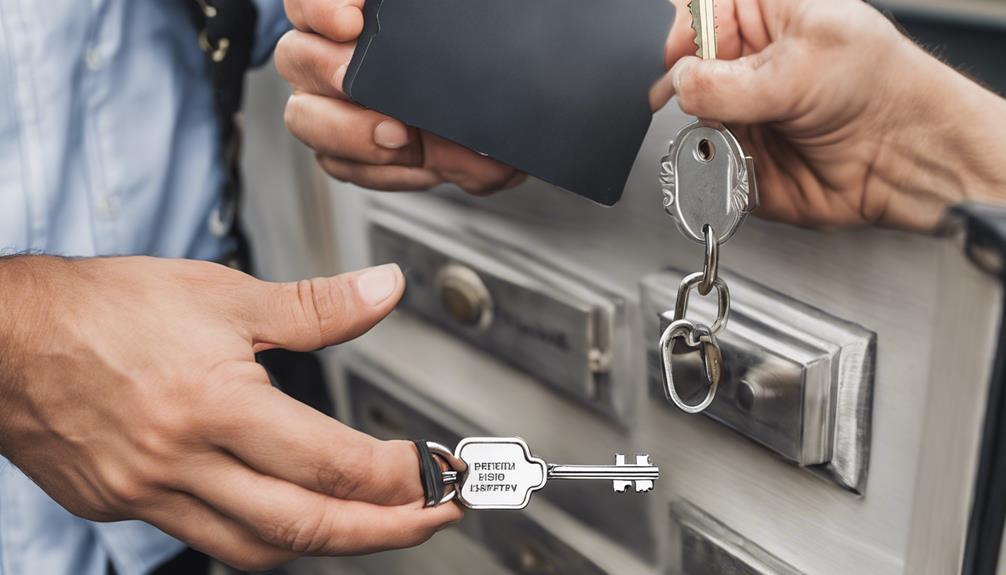
When it comes to key duplication, understanding key duplication laws is vital to guarantee compliance. Legal regulations dictate who can duplicate keys and under what circumstances. It's important to know the authorized duplicate sources to avoid any legal implications.
Key Duplication Laws
Key duplication laws govern the legal regulations surrounding the replication of keys. When it comes to key duplication, it is crucial to understand the dos and don'ts to guarantee key security and uphold locksmith ethics. Here are some key points to take into account:
- Ownership: You must have legal ownership or authorization to duplicate a key.
- Patented Keys: Some keys are patented, meaning their duplication is restricted by law.
- Locksmith Licensing: Only licensed locksmiths should duplicate keys to guarantee quality and security.
- Security Concerns: Unauthorized key duplication can compromise the safety of a property or individual.
Authorized Duplicate Sources
To comply with key duplication laws and secure the safety of your property, it is imperative to be aware of authorized sources for duplicating keys. When it comes to key security, locksmith services play a vital role. Authorized duplicate sources typically include locksmiths who are certified and adhere to legal regulations. These professionals have the expertise and equipment necessary to duplicate keys accurately while maintaining the security of your property. Avoid unauthorized key duplication services, as they may compromise the integrity of your keys and pose a security risk. By choosing authorized sources such as reputable locksmith services, you can ascertain that your keys are duplicated legally and securely, giving you peace of mind regarding the protection of your property. Additionally, it is essential to understand the risks associated with low-cost locksmith services, as highlighted in the Hidden Dangers of Cheap Locksmith Services article.
Can Restricted Keys Be Duplicated?
Restricted keys are designed with legal duplication restrictions in place to enhance key control measures. These restrictions typically require an authorized duplication process to guarantee keys are copied only by approved individuals or locksmiths. By adhering to these regulations, organizations can maintain the security and integrity of their restricted key systems. Additionally, locksmiths play a vital role in confirming the proper duplication of restricted keys, as highlighted in a recent exploration of high-security key duplication capabilities on the illchangethislater blog.
Legal Duplication Restrictions
When considering the legal duplication restrictions surrounding certain keys, it is vital to understand the implications of attempting to replicate restricted keys. Unauthorized duplication of restricted keys can compromise the security of a facility and violate legal agreements. Here are four key points to keep in mind:
- Legal Consequences: Unauthorized duplication of restricted keys can lead to legal action due to breach of security agreements. It's important to be aware of the risks involved in duplicating keys, especially regarding compromising security The Risks of Duplicating Keys: What You Should Know.
- Security Risks: Replicating restricted keys undermines access control measures, increasing the risk of unauthorized entry.
- Manufacturer Guidelines: Restricted keys are often protected by patents, making their duplication illegal without proper authorization.
- Professional Locksmiths: Only authorized locksmiths with the necessary credentials should duplicate restricted keys to guarantee compliance with legal restrictions.
Key Control Measures
Considering the legal implications and security risks associated with unauthorized key duplication, it becomes imperative to explore the key control measures in place to prevent such breaches. Key security is a top priority in maintaining access control to restricted areas. To enhance security, key control measures involve strict protocols for key issuance and return, as well as maintaining accurate records of who has access to specific keys. Implementing key control systems that track key movements and require authorization for duplicate requests adds an extra layer of protection. Regular audits of key usage further guarantee that only authorized individuals have access. By incorporating these key control measures, organizations can greatly reduce the risk of unauthorized key duplication and enhance overall security. Understanding Lock Re-Keying and Its Benefits can also provide insights into enhancing key control practices.
Authorized Duplication Process
To address the question of whether restricted keys can be duplicated, it is important to understand the authorized duplication process. When it comes to key security, authorized duplication methods play a significant role. Here are four key points to take into account:
- Verification: Before duplicating a restricted key, individuals must provide proper identification and authorization. Additionally, Troubleshooting Key Duplication Issues can help resolve common problems with duplicated keys.
- Documentation: The duplication process typically requires the completion of specific forms to track the key's distribution.
- Validation: Only approved locksmiths or authorized personnel are allowed to duplicate restricted keys to maintain security.
- Record-Keeping: Detailed records of each duplicated key are kept to guarantee accountability and prevent unauthorized copies.
Understanding the authorized duplication process is essential in upholding key security standards and preventing unauthorized key duplication.
Circumstances for Legal Duplication
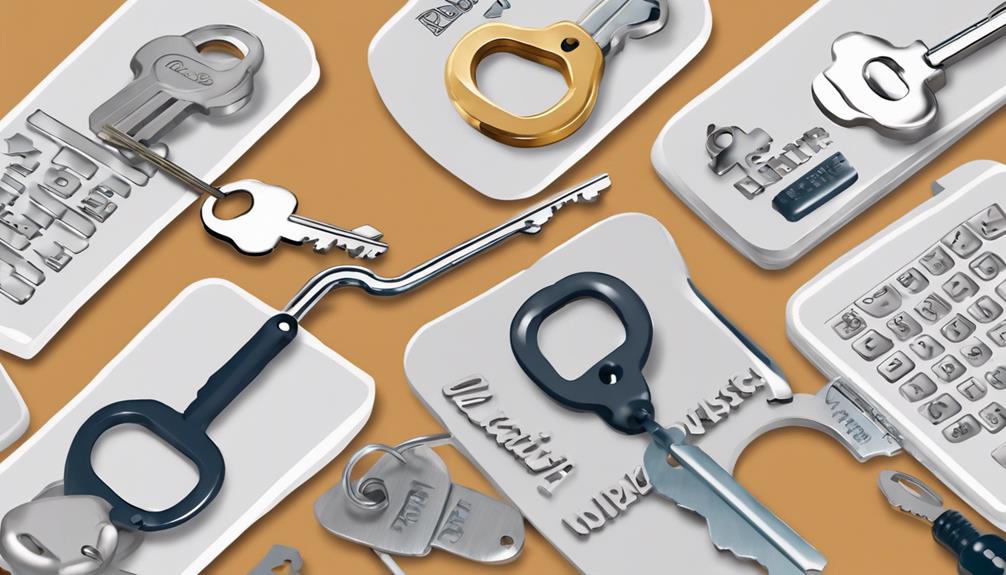
Under certain circumstances, legal duplication of restricted keys is permitted. When it comes to key ownership, the rights and responsibilities that come with it can determine if you're allowed to make duplicates of restricted keys. For instance, if you're the owner of a property that uses restricted keys and you need to provide access to trusted individuals, you may be legally allowed to duplicate these keys. However, it's vital to reflect on the security implications of such actions. Unauthorized duplication of restricted keys can compromise the security of your property or assets. Always verify that any legal duplication is done with the utmost care and with the intention of maintaining the security measures put in place.
Low Rate Locksmith's Expertise
Demonstrating extensive proficiency in the locksmithing sector, Low Rate Locksmith offers a wide array of specialized services tailored to meet your security needs effectively. When it comes to locksmith services and key security, Low Rate Locksmith stands out for the following reasons:
- Diverse Expertise: From traditional lock installations to high-tech security systems, they handle it all. Additionally, Low Rate Locksmith can provide insights on the benefits of re-keying locks for improved security and cost savings.
- Rapid Response: Need assistance urgently? Low Rate Locksmith prides itself on quick and efficient service.
- Cutting-Edge Technology: They stay updated on the latest advancements in key security to provide first-rate solutions.
- Customer Satisfaction: Your peace of mind is their priority; they guarantee your security needs are met with precision and care.
With Low Rate Locksmith, your key security is in expert hands!
Nationwide Adherence to Legal Standards
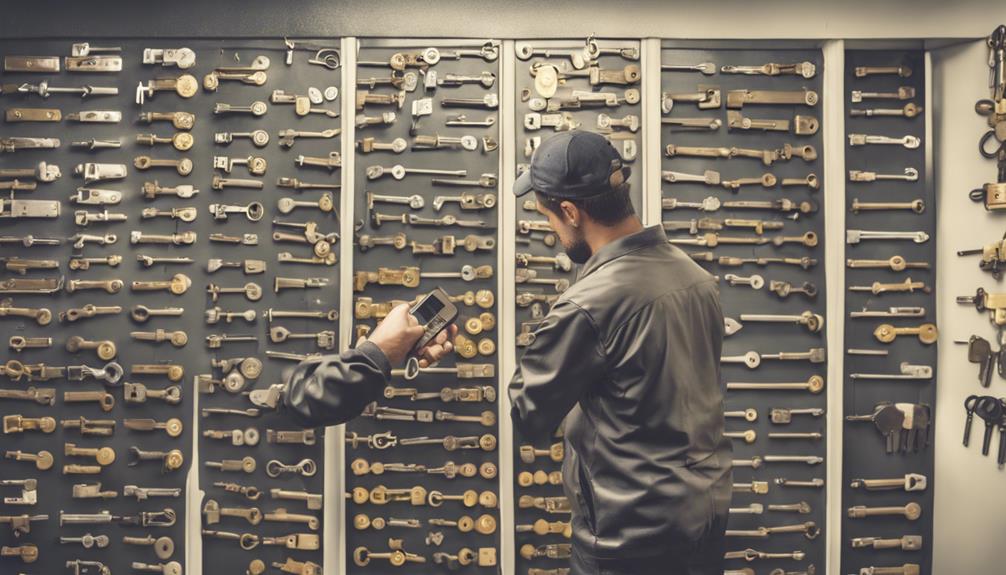
Nationwide standards for locksmiths guarantee the legality and ethical practices of key duplication and security services across the country. When it comes to key security, adherence to these standards guarantees that locksmiths operate within the bounds of the law and uphold locksmith ethics. This means that your local locksmith should be well-versed in the legalities surrounding restricted keys and key duplication, providing you with peace of mind knowing that your property is secure. By following these national guidelines, locksmiths maintain a level of professionalism and trustworthiness that is essential in the security industry. Professionals can also offer insights on when to hire a professional for security system installation, guaranteeing thorough security solutions for your property. So, next time you need a key duplicated or a lock serviced, make sure your locksmith is following the proper legal standards to safeguard your key security.
Conclusion
In summary, restricted keys offer a unique level of security and protection for valuable assets. Remember, when it comes to key duplication, always adhere to legal regulations to avoid any potential consequences. Just as a key opens doors, knowledge opens opportunities. Stay informed and empowered to make smart decisions in safeguarding your property.

